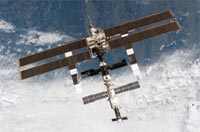Maneuver to raise space station's orbit fails after engine problem
Russian engineers failed to raise the orbit of the international space station by a planned distance Thursday and Russian and U.S. officials were discussing whether it would affect the upcoming launch of the U.S. space shuttle Discovery.

Federal Space Agency spokesman Valery Lyndin said the engines on the Progress M-58 cargo ship docked at the station were supposed to fire for around 17 minutes and push the station around 7 kilometers (4 miles) higher. However they unexpectedly shut off early, pushing the station just 1.5 kilometers up.
He said engineers were trying to figure out why the engines failed; the Interfax news agency quoted an official from the company Energia, which makes the Progress ships, as saying that engineers would try to fire the engines again on Saturday.
"In principle, this docking is possible at this height of the orbit. However, there are additional nuances that should be taken into consideration," another Russian space official, Igor Paninin, was quoted as saying by Interfax.
The station's orbit at about 350 kilometers (220 miles) above the Earth is periodically corrected to compensate for Earth's gravity, which slowly pulls it downward over time. The corrections are typically made before the launch of Russian cargo and transport ships or the U.S. shuttles, reports AP.
The U.S. space agency NASA has announced plans to launch the shuttle Discovery Dec. 7 for the third shuttle flight of the year.
Subscribe to Pravda.Ru Telegram channel, Facebook, RSS!


